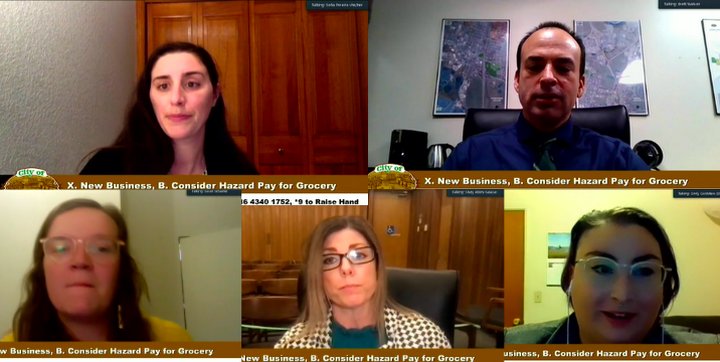
Arcata City Council (clockwise from top left) Sofia Pereira, Brett Watson, Emily Goldstein, Stacy Atkins-Salazar, Sarah Schaefer | Screenshots from Zoom meeting
###
Following a lengthy discussion on Wednesday night, the Arcata City Council was a little torn on how to move forward with drafting an ordinance that would require grocery stores to provide “hazard pay” for workers during the pandemic. Ultimately, the council decided that it needs more information on how the ordinance would affect the workers, business owners and the City.
The request for a hazard pay ordinance was brought forward by the local branch of the United United Food and Commercial Workers, UFCW Local 5, part of a fight the union has been leading across the state to secure temporary wage increases for grocery employees who have been working throughout the pandemic.
Arcata City Manager Karen Diemer began by giving some background to the council, saying that eight other California cities, including Los Angeles and San Francisco have passed a hazard pay ordinance — which all essentially require a $3 to $5 hourly increase for the protected employees, prohibit retaliation against workers for asserting their rights under the ordinances and require records of compliance from the businesses.
However, Diemer added that “most of the cities that have enacted this are under some sort of litigation.”
Arcata City Attorney Nancy Diamond said that she would need to more extensively investigate the legal implications of a hazard pay ordinance, and also said that the council needs to consider factors like the role vaccines play in mitigating the health risks of grocery store employees. Many grocery store employees are now vaccinated, Diamond said, and they were not when other cities enacted their ordinances.
Several members of UFCW Local 5 voiced their support for the ordinance during the meeting, saying that large grocery stores have seen significant profit increases since the onset of the pandemic and have not passed those profits on to the employees, who have been in a position of increased risk of contracting COVID-19.
“Simply put, these are not workers who can work from home and this essential work remains unrecognized,” Mario Fernandez, an organizer and researcher for UFCW Local 5 said during the meeting.
A local grocery store owner who spoke during the meeting argued that requiring a pay increase would have a severe financial impact on her business, which has seen an eight percent decline in profit in the past year. The speaker did not say her name or identify which store she owns, but said that they have 40 employees and if an ordinance like this were to pass, they would likely have to lay off several workers.
The council members were a little split in their feelings, with council members Emily Grace Goldstein and Sarah Schaefer ardently supporting the idea of the extra pay for grocery workers.
“Working in the middle of a pandemic that’s scary and dangerous is not something you think you’re going to be doing when you agree to work at a grocery store,” Councilmember Goldstein said during the meeting. “I would like to see a recognition of that type of sacrifice that has kept our community fed all year.”
Council members Sofia Pereira, Brett Watson and Stacy Atkins-Salazar were a bit more hesitant in moving forward with an ordinance, however, questioning the potential legal ramifications and the burden it would place on business owners.
Mayor Sofia Periera also had concerns that this ordinance would only benefit a small portion of the community’s essential workers. “I think about the workers who are not public-facing and yet, working in agriculture or production, experience high risk,” Pereira said. “We have seen outbreaks across the country and in our own community that are not covered by this ordinance that is being proposed.”
Agreeing that it is important to ensure the ordinance does not disproportionately impact small business, the council discussed how many employees a store would need to have to be subject to the pay increase. Watson felt that the council could not realistically decide on a number, without first seeing a list of all the grocery stores in Arcata and the number of employees they have.
The rest of the council agreed and unanimously voted to direct staff to pursue more information about our local grocery stores, the potential legal ramifications of the ordinance and financial impacts it might have on the business owners. The council will continue its discussion on hazard pay for grocery store employees at a future meeting.
“I’m just hesitant to meddle in the finances of businesses that we’re not 100 percent sure of,” Councilmember Atkins-Salazar said. “I just need more assurances that this can be absorbed financially by the local stores.”
###
PREVIOUSLY: Arcata City Council May Require Higher Pay for Grocery Store Workers During the Pandemic
CLICK TO MANAGE